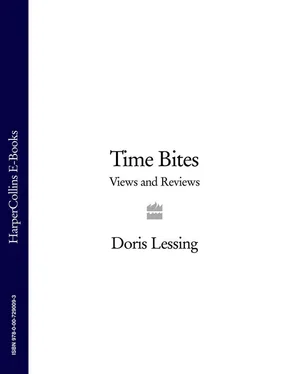DORIS LESSING
Views and Reviews

1 Jane Austen
2 D. H. Lawrence’s ‘The Fox’
3 Carlyle’s House: Newly discovered pieces by Virginia Woolf
4 On Tolstoy
5 The Man Who Loved Children
6 Kalila and Dimna – The Fables of Bidpai
7 Speech at Vigo on getting the Prince of Asturias Prize 2002
8 Censorship
9 The Forgotten Soldier , Guy Sajer
10 Preface to Ecclesiastes, King James Version
11 Writing Autobiography
12 The Amazing Victorian: A Life of George Meredith
13 Bulgakov’s The Fatal Eggs
14 ‘Now You See Her, Now You Don’t’
15 Stendhal’s Memoirs of an Egotist
16 Lost Civilisations of the Stone Age
17 Henry Handel Richardson
18 A reissue of The Golden Notebook
19 Anna Kavan
20 Philip Glass
21 Trail of Feathers
22 William Philips, who died in 2002
23 Books
24 Niccolo` Tucci’s Before My Time
25 The Wrong Way Home
26 Biography
27 About Cats
28 The Maimie Papers
29 Olive Schreiner
30 When I was young . . .
31 Preface for the Writers’ and Artists’ Yearbook 2003
32 Simone de Beauvoir
33 My Room
34 A book that changed me
35 The Autobiography of an Unknown Indian, Nirad C. Chaudhuri
36 Old
37 Professor Martens’ Departure
38 How Things Were
39 A Nazi Childhood
40 Knowing How to Know: A Practical Philosophy in the Sufi Tradition
41 The tragedy of Zimbabwe
42 East meets West: The Elephant in the Dark
43 ‘What novel or novels prompted your own political awakening?’
44 The most significant book to come out of Africa
45 The Sufis
46 The Ice Palace: Frozen secrets stranded in a waterfall
47 Problems, Myths and Stories
48 After 9.11
49 The Past is Myself , Christabel Bielenberg
50 The Story of Hai
51 Sufi philosophy and poetry
52 The Way
53 A week in Heidelberg
54 Dancing with Cuba , Alma Guillermoprieto
55 For a Book Trust pamphlet
56 The Three Royal Monkeys , Walter de la Mare
57 Catlore , Desmond Morris
58 The Englishman’s Handbook
59 A. E. Coppard
60 A Festschrift , Idries Shah
61 The Nine Emotional Lives of Cats
62 Mukiwa: A White Boy in Africa
63 Clarissa
64 Summing up: when Idries Shah died
65 Opera
Acknowledgements
About the Author
Review
By The Same Author
Copyright
About the Publisher
If there is one generally popular novel in the English language, it is Pride and Prejudice and this was true before a recent successful television version. It has always been taken seriously by the eminent in society and in literature: Jane Austen was celebrated from her first book, Sense and Sensibility . It is a very English novel, and foreigners have been known to question our admiration. Class and money! – and where are the great themes of Life and Death? So come the criticisms, still, and the reply often is that class and money defined the lives of the novel’s characters, not to mention the life of the woman who wrote it. So let us deal with these issues first, leaving aside for the moment the real themes of the book.
Jane Austen was a member of a network of middle-class families that merged upwards into the aristocracy, but her own family was poor. Her father, with six children – two girls and four boys – to feed and clothe and find careers for, had to take in pupils, so the home was for part of the year a school, noisy and full of rambunctious boys. Jane and her sister Cassandra felt themselves to be, and were often treated as, poor relations, dependent on presents, little trips and handouts from better-off and generous relatives. Not until – late – Jane earned some money writing, did she enjoy any kind of independence. Her situation was a common one then for poor unmarried women anywhere in Europe.
She has often been portrayed as a conventional spinster, partly because of Mary Mitford’s unfriendly description of her as ‘a poker’ – upright and judging. She was malicious – this time the critic is Virginia Woolf quoting not very attractive bon mots at others’ expense. She wrote her immortal novels in corners, always ready to set them aside to take part in tea and gossip. What do we have here? A woman of the kind I remember from when I was a girl, the unmarried maiden aunt, ready to be useful to others, without any life of her own, a pitiable figure. Austen was supposed, so we have often read, to be a sheltered woman, her experience limited to village life and a narrow middle-class circle.
Here is a quote from an article by a once influential critic, Demetrius Capetanakis, in the very influential periodical New Writing and Daylight for winter 1943–4 – that is, in the middle of the war. ‘Round every page of Jane Austen’s novels one feels the hedge of an eighteenth-century English home. It is the hedge of “sense”, of logic, or rather the logic of a person leading a secure life in the midst of a secure society. Jane Austen was protected by a hedge of unquestionable values …’ Nothing could be further from the truth. First of all, her situation among the genteel poor exposed her: there can be few worse positions in society, even if often useful for the creation of literature. She had a close woman friend in the fashionable world, a cousin, probably Warren Hastings’ illegitimate child, married to a French count who lost his head to the guillotine. The whole course of the French Revolution and its aftermath must have seemed as close to her as news from her own family. Her four brothers were often off fighting in the Navy against Napoleon, in danger, and afflicting their family with anxiety. Above all, Jane was enmeshed in the lives of female relatives and friends, who were always pregnant, nursing, giving birth to innumerable children who died then so easily and often. And, more potent as an influence than anything, Jane was sent as a tiny child to boarding school, and there was as miserable and neglected as Jane Eyre was at her school.
The triumph of Jane Austen’s art was that the little piece of ivory she claimed as her artistic territory was carved out of such an abundance of experience and material. She excluded and refined. That means for people now who know even a little about that time, her stages seem confined brightly lit places where all around loom and mass shadows, dangers, tragedy. Nowhere in an Austen novel does an aristocrat lose his head, a woman die from milk fever or puerperal fever, or give birth to a mentally sick child, like her cousin Eliza. Pain and grief are cured by love, kindness and presumably kisses, though I cannot imagine more than a chaste kiss in an Austen novel: more and the delicate fabric, the tone, would be destroyed.
Jane Austen loved well and lost, young. He was Irish and he loved her too, and now it seems this marriage would have been made in heaven, but he was poor, had a mother and sisters to support, and so he must marry for money. This abnegation was understood by both sides. But she did love him, and he her, and the pain of it is, so it is generally thought, in Persuasion .
Читать дальше












